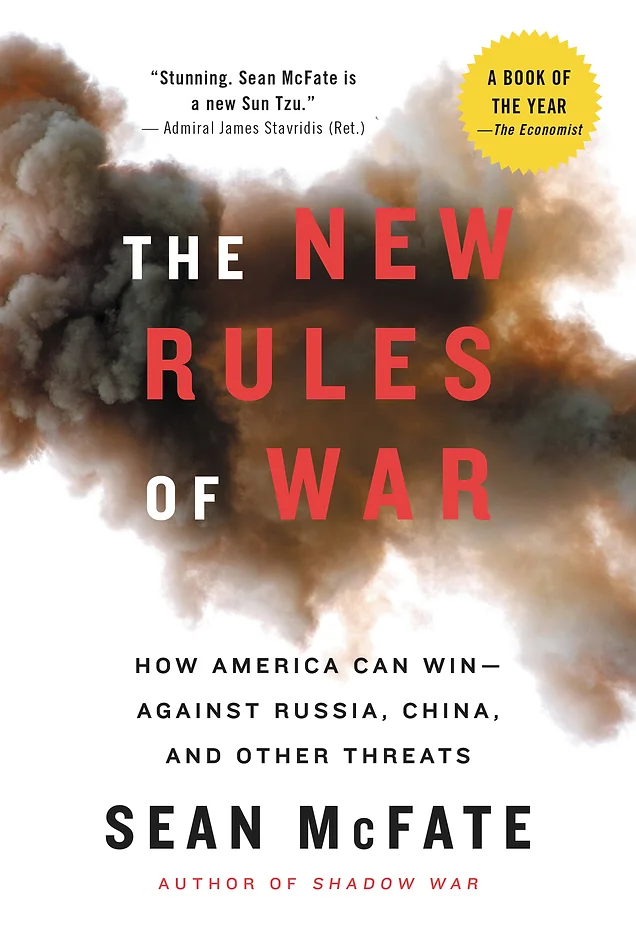
The New Rules of War: Victory in the Age of Durable Disorder

Author: Sean McFate
Published: 2019
Publisher: William Morrow Paperbacks
Pages: 368
Reviewed by: Patrick J. Camatcho
In The New Rules of War: Victory in the Age of Durable Disorder Sean McFate takes readers on a compelling journey through the evolving landscape of modern warfare, dissecting the shifts in tactics, strategies, and actors that have reshaped the nature of conflict. With a keen focus on unconventional warfare, McFate presents an urgent exploration of how non-state actors, technological advancements, and ideological battles are redefining the rules of engagement on the global stage.
McFate’s book delves into the premise that the traditional rules of war, as established by nation-states and governed by international law, are becoming increasingly irrelevant. He argues that the rise of non-state actors, private military companies, and the democratization of technology have led to a new era of warfare that transcends traditional boundaries of conventional units and tactics. The author draws from his extensive experience as a former paratrooper, private military contractor, and professor to provide insightful anecdotes and real-world examples that illustrate the changing dynamics of conflict. Throughout the book, McFate takes readers on a tour of modern warfare’s various facets, exploring everything from cyberattacks and political warfare to the exploitation of social media for propaganda purposes. He highlights the concept of “shadow warfare,” where state and non-state actors engage in subtle, deniable tactics that blur the lines between peace and conflict. McFate also emphasizes the importance of narrative and perception in today’s warfare, showcasing how winning the information battle can be just as crucial as traditional military victories.
One of the book’s notable strengths is its ability to demystify complex concepts related to modern warfare. McFate’s writing style is accessible and engaging, making it suitable for both experts and readers with limited prior knowledge on the subject. He weaves together historical examples, current events, and personal experiences to create a well-rounded narrative that captures the book’s central thesis. Moreover, McFate’s emphasis on the unconventional aspects of warfare sheds light on the tactics used by state and non-state actors to achieve their objectives. He challenges conventional thinking and offers fresh perspectives on how conflicts are now waged in the realms of information, technology, and ideology.
While The New Rules of War succeeds in highlighting the evolving nature of conflict, some critics might argue that McFate’s approach leans heavily toward a pessimistic outlook. The book focuses on the vulnerabilities of traditional military approaches without delving deeply into potential solutions or counterstrategies. This could leave readers feeling overwhelmed by the challenges presented and in search of more concrete recommendations for adapting to this new paradigm. Additionally, the book’s broad scope occasionally results in a lack of depth in certain areas. For readers seeking an in-depth analysis of specific subjects like cyber warfare or the role of private military companies, the coverage might feel somewhat cursory.
Sean McFate’s The New Rules of War serves as an urgent wake-up call to the changing face of warfare in the 21st century. By shedding light on the rise of non-traditional actors, the influence of technology, and the blurring of boundaries between war and peace, McFate challenges readers to reevaluate their understanding of conflict. The book’s accessible style and engaging storytelling make it a valuable resource for anyone seeking to comprehend the complex dynamics of contemporary warfare. While the book’s focus on challenges might leave some readers desiring more comprehensive solutions, its strengths lie in its ability to provoke thought and conversation about the future of global conflict. As the world navigates a rapidly changing landscape, The New Rules of War encourages readers to rethink their assumptions and approach to security, making it a must-read for anyone interested in the evolving world of warfare.
Patrick Camatcho is a current Army Reserve Psychological Operations Lieutenant and dedicated professional with a strong background in project management and leadership. His experience spans diverse industries, reflecting his passion for driving impactful results and fostering collaborative growth.